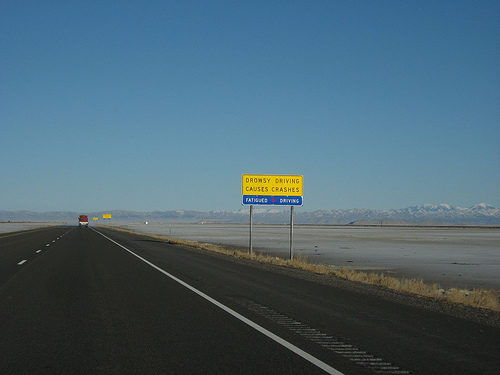The need for personal injury lawyers has significantly increased across Texas, especially due to accidents on the road. Whether it’s DWI accidents, distracted driving accidents or just simple accidents the number of car crashes isn’t decreasing. One interesting study we found shows that driving while drowsy can be just as if not more dangerous than driving while intoxicated, causing thousands of truck and car accidents each year. The National Highway Traffic Safety Administration (NHTSA) has compared it to driving with a blood alcohol level at .10, well over the legal limit of .08. Driving while drowsy has proven to be extremely dangerous. NHSTA has estimated that each year close to “100,000 police-reported crashes are the direct results of drivers’ fatigue, resulting in an estimated 1,500 deaths, 71,000 injuries, and $12.5 billion in monetary losses.” So how do you know if you are becoming too drowsy to drive?

Know the warning signs of driving drowsy according to AAA Foundation for Traffic Safety
• The inability to recall the last few miles traveled
• Having disconnected or wandering thoughts
• Having difficulty focusing or keeping your eyes open
• Feeling as though your head is very heavy
• Drifting out of your driving lane, perhaps driving on the rumble strips
• Yawning repeatedly
• Accidentally tailgating other vehicles
• Missing traffic signs
Enough truck and car accidents happen every year, how can you avoid drowsy driving to prevent more truck and car accidents?
The AAA Foundation for Traffic Safety has conducted a list of what they believe to be the six most important guidelines a driver can follow in hopes to prevent drowsy driving.
• Get a good night’s sleep: The amount needed varies from individual to individual, but sleep experts recommend between 7-9 hours of sleep per night.
• Plan to drive long trips with a companion: Passengers can help look for early warning signs of fatigue, and switching drivers may be helpful. Passengers should stay awake and monitor the driver’s condition.
• Take regular breaks: Schedule regular stops – every 100 miles or 2 hours, even if you don’t feel tired, and more often if you feel like you need it.
• Avoid alcohol and medications: If medications warn that they cause or may cause drowsiness, avoid taking them before driving. If you must take certain prescription medications that cause drowsiness, don’t drive immediately after taking them.
• You should never consume alcohol before driving in the first place, but it is especially important to realize that alcohol interacts with fatigue, increasing sleepiness. If you are already tired, even a small quantity of alcohol may exacerbate your sleepiness and increase your risk of crashing, even if your BAC is well below the legal limit for a DWI conviction.
• Consult your physician or a local sleep disorders center: If you suffer frequent daytime sleepiness, experience difficulty sleeping at night, and/or snore loudly on a regular basis, consult your physician or local sleep disorders center for a diagnosis and treatment.
—–
The road is a dangerous place; don’t let you or someone you know drive while drowsy. If you or a loved one have ever been in a truck or car accident don’t hesitate to contact a lawyer to discuss your legal options. At Borchardt Law Firm we have seen and dealt with all types of personal injury cases and feel the work we do will protect future generations of Texans. Feel free to give us a call.
Toll Free: 866.832.9300
Phone: 817.332.9300
Fax: 817.332.9301
firm@attorneysmb.com
Burnett Building
801 Cherry St #1005
Fort Worth, Texas 76102
 Fort Worth Injury Lawyer Blog
Fort Worth Injury Lawyer Blog

